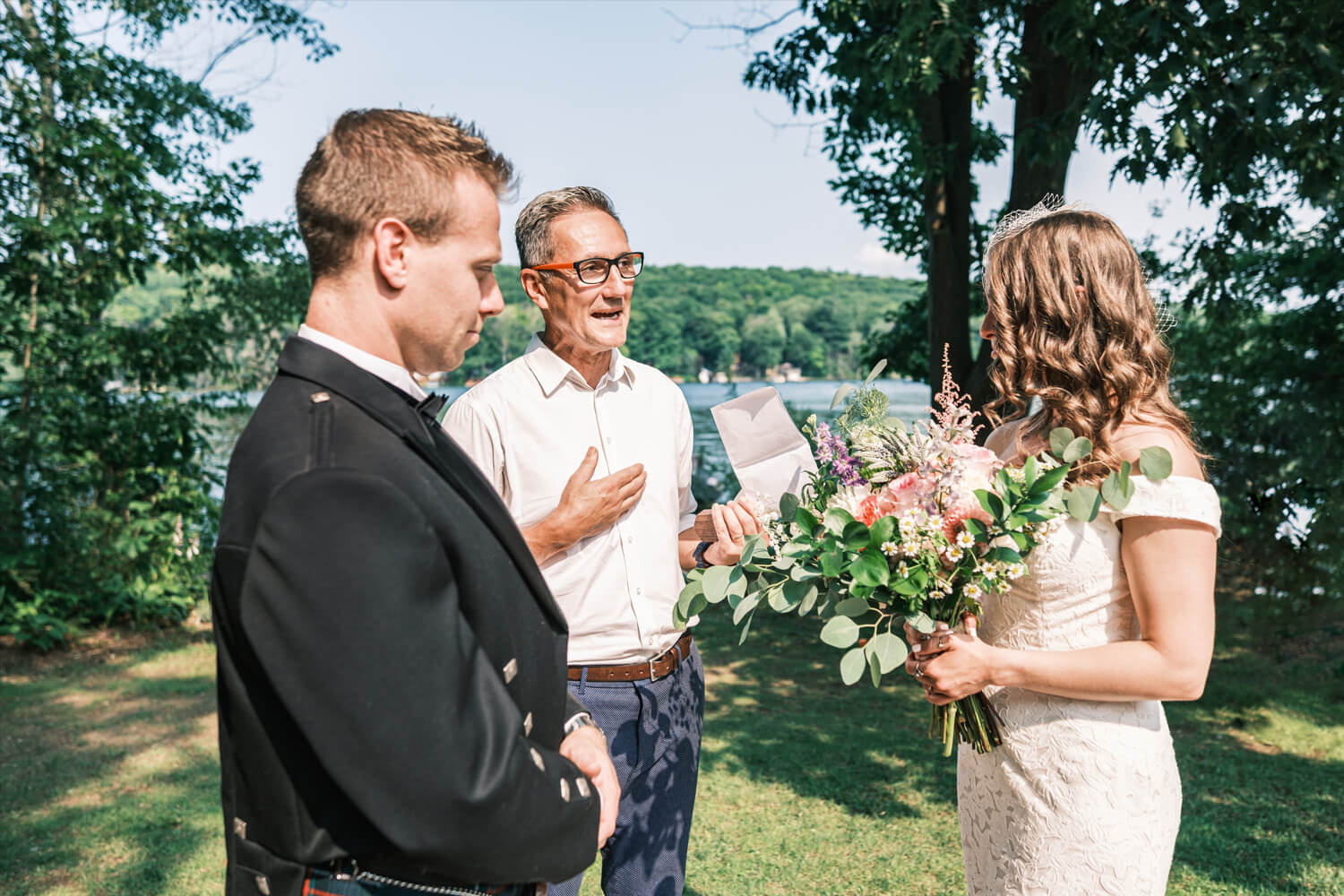Does an Officiant Have to Be Licensed?

Planning your dream wedding involves many exciting decisions, but choosing the right officiant is more than just a personal choice—it's also a legal requirement in most places. Understanding marriage officiant requirements can save you from a wedding day nightmare.
What happens if your officiant isn't legally authorized? Your marriage could be invalid. You might face extra paperwork, costly delays, and stress during what should be your happiest time. Some couples have discovered weeks later that their wedding wasn't legally binding.
This article will cover what you need to know about marriage officiant requirements, licensing, ordination, and how to make sure your wedding is legally valid.

Understanding marriage officiant requirements
A marriage officiant is the person who performs your wedding ceremony and makes it legally binding. They witness your vows, pronounce you married, and sign your marriage license. Without a qualified officiant, your wedding ceremony is just a party—not a legal marriage.
Marriage officiant requirements vary greatly by state, country, and sometimes even by county. What works in one place might not work in another. Always review your local laws and requirements before your wedding day. You can ask a lawyer in your area for exact expectations that you need to meet.
These people can typically officiate weddings:
- Ordained ministers from recognized religious organizations
- Judges and justices of the peace
- Certain public officials like mayors or county clerks
- Ship captains in some jurisdictions
Remember that couples must check their own jurisdiction's laws before the wedding. Don't assume your friend's online ordination will work everywhere.
Do I need someone to officiate my marriage?
Yes, most places require an officiant to make your marriage legal. You cannot simply declare yourselves married without proper authority witnessing the ceremony.
The legal purpose of an officiant includes witnessing your vows, pronouncing you married, and signing the marriage license. They serve as the state's representative to ensure your marriage meets legal standards.
However, some states allow self-solemnization, where couples can marry themselves without an officiant. Colorado and Pennsylvania are examples of states with this option. Even in these cases, you still need to follow specific legal procedures.

Does an officiant have to be licensed?
In most U.S. states, yes—officiants must have legal authority through a license, ordination, or government role. Simply wanting to perform a wedding isn't enough to make it legal.
The term "licensed" can mean different things depending on your location. It might mean ordained through a recognized religious organization. It could also be government-related, such as an individual who holds a specific government position or is authorized by local government. In some areas, the person you want to perform your wedding may only have to get a temporary permit to perform marriages.
Some states require officiants to register with local authorities before performing weddings. Others accept ordination from recognized religious groups without additional registration.
Always confirm your officiant's credentials before the wedding day. This simple step prevents major legal problems later.
What needs to be said by the officiant at a wedding?
Most states require specific legal language during the ceremony, but the exact words can vary. The officiant must clearly pronounce you as married and both parties must consent to the marriage.
The intent and pronouncement are the key legal elements. Some states require phrases like "by the power vested in me" or "I now pronounce you married." Others are more flexible with the wording.
Many states allow personalized vows as long as the required legal language is included somewhere in the ceremony. Check your local requirements to ensure your ceremony meets all legal standards. A lawyer can dig into the details and offer consultation on what needs to happen to make your marriage binding.
What is the difference between licensed and ordained ministers?
Licensed ministers receive temporary or specific authority to perform certain religious duties, including marriages. Ordained ministers receive permanent religious authority through formal religious training or ceremony.
Both licensed and ordained ministers can typically officiate weddings if they're legally recognized in your state. The key is ensuring your state accepts their credentials.
Licensed status might be temporary or limited to specific duties, while ordained status is usually permanent. However, both must still meet your state's marriage officiant requirements to legally perform weddings.

Who cannot be ordained?
Most ordaining organizations set their own rules about who can become ordained. There's no universal standard that applies everywhere.
Each religious or secular ordaining body has different requirements. Some traditional churches require extensive training and education. Others have minimal requirements for ordination.
Many online ordinations have very simple requirements—sometimes just filling out a form. However, the ease of getting ordained doesn't guarantee it's legally recognized in your state. State law still determines whether someone can officiate weddings, regardless of how they became ordained.
How to check if a wedding officiant is legal
Protecting your wedding starts with verifying your officiant's credentials. Don't be afraid to ask for proof—any legitimate officiant should be happy to provide documentation.
You can follow these steps to verify your officiant is legal:
- Request a copy of their ordination certificate or license
- Ask for their registration number if your state requires it
- Contact the organization that ordained them to confirm their status
- Check with your county clerk's office for verification
Your county clerk's office can often tell you exactly what credentials are needed in your area. They might even have a list of approved officiants or organizations.
Online resources can help verify ordination with recognized organizations. Many legitimate ordaining bodies have websites where you can confirm someone's ordination status.
Beyond basic verification, take these extra steps to ensure everything is perfect:
- Confirm your officiant knows your state's specific requirements
- Ask them to show you their plan for completing the marriage license
- Verify they'll be available for the entire ceremony duration
- Get their credentials in writing before your wedding day
Remember, if you have any doubts about whether an officiant has to be licensed in your area, you can contact your local marriage license office. They can answer questions like "Does a pastor have to be ordained to marry someone?" and "Can an ordained minister marry people?" for your specific location.
Ensuring your wedding is legally binding
Choosing the right officiant who meets local marriage officiant requirements is crucial for a valid marriage. Don't wait until the last minute to verify credentials—do this as soon as you choose your officiant.
Taking time to understand who can conduct a wedding and who can officiate a wedding in your area prevents expensive mistakes. Remember, the question "Do you need a license to officiate a wedding?" has different answers in different places.
Confirm your officiant's credentials early to avoid any chance of an invalid marriage. Your wedding day should be about celebrating love, not worrying about legal paperwork.

Legal support for your marriage journey
Marriage brings many legal considerations beyond just the ceremony. LegalShield Members get access to experienced attorneys who can help with prenuptial agreements, name changes, and other family law matters that arise before and after your wedding. From understanding your rights to handling complex legal documents, LegalShield provides the legal support you need during this important life transition.
Ready to protect your marriage with proper legal guidance? Visit LegalShield.com today to learn how affordable legal access can give you peace of mind for your wedding and beyond.
LegalShield is a trademark of Pre-Paid Legal Services, Inc. (“LegalShield”). LegalShield provides this blog as a public service and for general information only. The information made available in this blog is meant to provide general information and is not intended to provide legal advice, render an opinion, or provide a recommendation as to a specific matter. The blog post is not a substitute for competent legal counsel from a licensed professional lawyer in the state or province where your legal issues exist, and you should seek legal counsel for your specific legal matter. All information by authors is accepted in good faith. However, LegalShield makes no representation or warranty of any kind, express or implied, regarding the accuracy, adequacy, validity, reliability, availability, or completeness of such information. The materials contained herein are not regularly updated and may not reflect the most current legal information. No person should either act or refrain from acting on the basis of anything contained on this website. Nothing on this blog is meant to, or does, create an attorney-client relationship with any reader or user. An attorney-client relationship may be formed only after the execution of an engagement letter with an attorney and after that attorney has confirmed that no conflicts of interest exist. Nothing on this website, or information contained or transmitted by this website, is intended to be an advertisement or solicitation. Information contained in the blog may be provided by authors who could be a third-party paid contributor. LegalShield provides access to legal services offered by a network of provider law firms to LegalShield members through membership-based participation. LegalShield is not a law firm, and its officers, employees or sales associates do not directly or indirectly provide legal services, representation, or advice.



